Let us help you determine which ROBOTIS Solution would be the ideal platform for you to jumpstart a STEM & ROBOTICS Education in your class!
Pre-Kindergarten
|
|
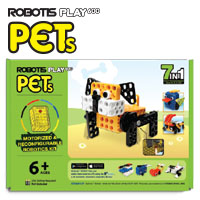 |
ROBOTIS PLAY 600
Consider the PLAY Series to learn mechanical engineering & design concepts by building various robot figures using our patented Plate & Rivet System!
The ROBOTIS PLAY 600 comes with the following specifications:
✅ 12MM Plates & Rivets
✅ Non-Programmable Motorized Controller (CM-20)
✅ 7 Reconfigurable Robot Builds
✅ Assembly Manual for 3 Robot Builds Included
✅ FREE R+Design App on IOS & Android Devices for Creative Construction
|
| Lower Elementary |
|
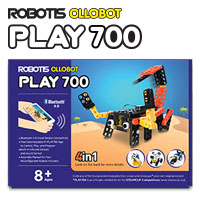 |
ROBOTIS PLAY 700
Use the PLAY 700 to begin a Fun & Educational Robotics Class using our Easy to Learn Plate & Rivet System, this time incorporating the use of several built in sensors (IR Sensor & Sound Sensor) to further your knowledge of robotic concepts.
The ROBOTIS PLAY 700 comes with the following specifications:
✅ 12MM Plates & Rivets
✅ Programmable Controller with built-in (IR + Sound Sensors)
✅ Bluetooth BT-410 Capable
✅ 4 Reconfigurable Robot Builds
✅ Assembly Manual for 4 Robot Builds Included
✅ FREE R+PLAY700 App for iOS & Android Devices for various functions such as Remote Control, Line Tracing, and Line Avoiding.
|
| Higher Elementary |
|
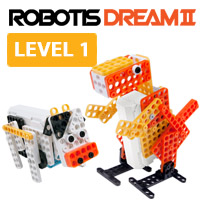 |
ROBOTIS DREAM II Levels 1 - 5
Our ROBOTIS DREAM Series comes with five levels starting from the entry level, Level 1 for learning the basic principles of robotics leading up to advanced principles of robotics beginning from Level 3.
The ROBOTIS DREAM comes with the following specifications:
✅ 6MM Plates & Rivets
✅ Programmable Controller (CM-150)
✅ BT-410 Bluetooth Module Included.
✅ 2 Servo Motor, 3 Geared Motors & Various sensors (IR Sensor, LED Module) Included.
✅ Remote Controller (RC-100B) included in Level 3 for fun activities.
✅ 5 Curriculum Workbooks Included (1 for each level)
✅ 48 Different Robot Configurations
|
|
|
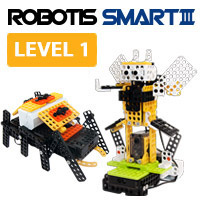 |
ROBOTIS SMART III Levels 1-5
Our ROBOTIS SMART Series comes with five levels starting from the entry level, Level 1 for learning and teaching the basics of robotics all the way to advanced principles of robotics which is featured in Level 5.
The ROBOTIS SMART comes with the following specifications:
✅ 6MM Plates & Rivets
✅ Programmable Controller (CM-200)
✅ BT-410 Bluetooth Module Included
✅ 2 Geared Motors, 1 Servo Motor, & Various sensors ( Touch Sensor, Color Sensor, IR Sensor, Magnetic Sensor) Included.
✅ 57 Different Robot Configurations
|
| Jr. High & High School |
|
 |
ROBOTIS MINI
The ROBOTIS MINI is a 3D Printable, Fully Programmable & Customizable miniature humanoid robot featuring 16 DYNAMIXEL XL-320 Servos (16 DOF) and a ROBOTIS OpenCM 9.04 Controller (You can swap out the controller and use your own Arduino or MicroController for additional activities).
The ROBOTIS MINI comes with the following specifications:
✅ 6MM Rivets
✅ 16 DYNAMIXEL XL-320 Servos Included
✅ 4 DYNAMIXEL XL Ports
✅ ROBOTIS OpenCM 9.04C (MicroController) Included
BT-210 Bluetooth Module Included
✅ 70+ Page QuickStart Guide Included
✅ STL Files for 3D Printing available online (FREE)
|
|
|
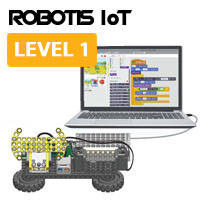 |
ROBOTIS IOT
For DIY enthusiasts, consider the ROBOTIS IOT Kit. Enhance your creativity and problem-solving skills by developing your custom robot to apply practical applications turning your robot from fun to functional.
The ROBOTIS IOT comes with the following specifications:
✅ 16MM Plates & Rivets
✅ OpenCM 7.0 (Microcontroller) Included
✅ 1 Servo Motor, 2 IR Sensors Included
✅ 10 Sensor and 1 LED Module
|
|
|
 |
ROBOTIS STEM Levels 1-2
The ROBOTIS BIOLOID STEM STANDARD designed for students in Jr. High and up provides an organized learning system by integrating Science, Technology, Engineering, and Mathematics Principles (STEM).
The ROBOTIS STEM comes with the following specifications:
✅ Standard Screws and Nuts
✅ 2 DYNAMIXEL AX-12W Servo Motors & 4 DYNAMIXEL AX-12A Servo Motors Included
✅ 2 Curriculum Workbooks Included (1 for each level)
✅ 16 Different Robot Configurations
✅ Programmable CM-530 Controller Included
|
|
|
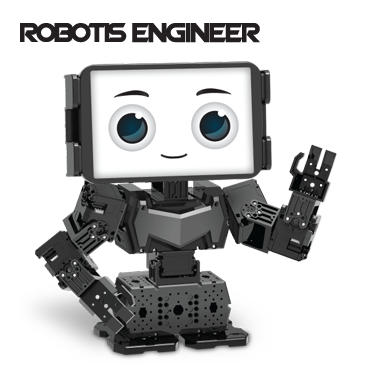
|
ROBOTIS ENGINEER Level 1-2
The ROBOTIS ENGINEER designed for students in Jr. High and up provides an organized learning system by integrating Science, Technology, Engineering, and Mathematics Principles (STEM).
✅ One kit can make 3 different AI type robots (Dr.R, SPI & MAX-E1)
✅ Latest CM-550 controller with ARM Cortex M4
✅ 2 Axis servo actuator, DYNAMIXEL 2XL430-W250-T)
|
|
|
 |
ROBOTIS PREMIUM
The ROBOTIS BIOLOID Premium is an all-purpose DIY robot kit for education, robot competitions and entertainment.
The ROBOTIS Premium comes with the following specifications:
✅ Standard Screws and Nuts
✅ 18 DYNAMIXEL AX-12A Servo Motors Included
✅ Assembly Manual & QuickStart Guide Included
✅ 1 Remote Controller (RC-100B) Included
✅ Programmable CM-530 Controller Included
✅ 29 Different Robot Configurations for intermediate and advanced users.
|
 |
ROBOTIS GP
The ROBOTIS GP is a high-performance humanoid robot geared for racing, soccer, fighting, and other competitive activities.
The ROBOTIS GP comes with the following specifications:
✅ Standard Screws and Nuts
✅ Lightweight Aluminum Frame Set Included
✅ 6 DYNAMIXEL AX-12A and 10 DYNAMIXEL AX-18A Servo Motors Included ✅ 2pc Gripper Included
✅ Assembly Manual & Quickstart Guide Included
✅ 1 Remote Controller (RC-100B) Included
✅ Programmable CM-530 Controller Included
|
Looking for robotics curriculum that is ready to go out of the box?
ROBOTIS is creating educational kits that are not only innovative and fun, but also easy for parents and teachers to begin robotics education right away! All kits come with the assembly workbook or curriculum workbook included.
Our curriculum workbooks are provided with the majority of our robotics kits for simple integration to any existing classroom or club! Each curriculum workbook has 12 chapters, and multiple reconfigurable robot examples.
Interested in NGSS & CCSS Adaptable Curriculum?
Our ROBOTIS educational kits can easily be implemented in many different settings from after school programs and short term classes, to full 8-week and 16-week long classes. The ROBOTIS Kits' lesson plan can be easily adaptable to align with the NGSS and CCSS framework.
STEM principles are covered in detail within the lesson plan, and the progressive nature of our kits ensures that the students are constantly engaged. The modularity of the kits allows students to build many different robot examples and encourage students to be creative with their own robot builds.
Make Your Own Robot using our DYNAMIXELs
The cost of building a robot is lowered significantly as your phone contains powerful processing capabilities and a wide variety of sensors. The idea behind the "Your Customize kit” is to create robots that are functional / have practical use.
We highly encourage users to a) customize their robots by printing and utilizing 3D printed parts and b) uploading and sharing their custom applications and providing robot builds assembly instructions and programming instructions (BOM, programming tutorials, STL files, etc.).
|





















